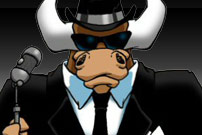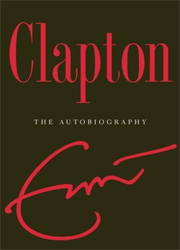 With the temperature dropping, it's time to find someone to keep you warm. Find your hookups with our online dating guide!
With the temperature dropping, it's time to find someone to keep you warm. Find your hookups with our online dating guide!
- Memoir
- 2007
- Buy the book
Reviewed by Jeff Giles
()
n autobiography from the guy who recorded such classic lite-FM snoozers as “Wonderful Tonight” and “Change the World” – it’s gotta be Sominex on paper, right? You could certainly be forgiven for thinking so, but fortunately, “Clapton: The Autobiography”is quite the opposite. As a matter of fact, it’s a minor classic of the genre.
One of the first questions facing any memoirist is that of where to begin. Most readers couldn’t care less about Rock Star X’s childhood experiences, but that doesn’t stop many of them from devoting chapters upon chapters to their family backgrounds and high school report cards. In “Clapton,” we’re introduced to the guitarist as a young boy; fortunately for readers, the book isn’t 15 pages old before we’re learning that he grew up believing his grandparents were his parents, and his uncle was his brother. It was a source of deep shame and pain for Clapton, but it makes for a nifty way of getting things off to a fast start here – and it provides some useful subtext for his life’s path, too.
If you know anything about Clapton, then you know “his life’s path” is not only a reference to the millions of records he’s sold, but the decades spent in the grip of various addictions; he went from being one of the world’s most famous heroin addicts to one of its best-known alcoholics before finally cleaning up and settling into overdue domestic bliss. If the book has a real Achilles’ heel, it’s Clapton himself – he presents himself as a nice enough guy, but one with absolutely no concept of love or personal responsibility throughout his first four decades on the planet. After famously wooing his best friend’s wife for years – and getting her to marry him – he proceeds to systematically destroy their relationship. On the musical front, pretty much everything he recorded between 461 Ocean Boulevardand Journeyman is a drug-and-alcohol-fueled blur.
And, of course, he wound up settling down with a woman half his age.
Fame and luxury notwithstanding, it doesn’t sound like much fun for anyone involved; the chapter dealing with the horrific death of Clapton’s son Conor is particularly grueling. It sure makes for interesting reading, however, and if you’ve tended to view Clapton’s work with suspicion, the book provides a helpful roadmap for anyone who wants to know where to start their collection – or at least an idea of just what all the fuss has been about all these years. By the time “Clapton” draws to a close, and Slowhand is hunkered down in the woods, shooting game with Steve Winwood and Mark Knopfler, you can’t help but be happy for him. Put in musical terms, “Clapton” is much closer to Layla than, say, Behind the Sun; it’s worth picking up for any music fan in your life, whether they think they care about Clapton or not.You can follow us on Twitter and Facebook for content updates. Also, sign up for our email list for weekly updates and check us out on Google+ as well.











